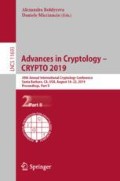Abstract
In this work we present a collection of compilers that take secret sharing schemes for an arbitrary access structure as input and produce either leakage-resilient or non-malleable secret sharing schemes for the same access structure. A leakage-resilient secret sharing scheme hides the secret from an adversary, who has access to an unqualified set of shares, even if the adversary additionally obtains some size-bounded leakage from all other secret shares. A non-malleable secret sharing scheme guarantees that a secret that is reconstructed from a set of tampered shares is either equal to the original secret or completely unrelated. To the best of our knowledge we present the first generic compiler for leakage-resilient secret sharing for general access structures. In the case of non-malleable secret sharing, we strengthen previous definitions, provide separations between them, and construct a non-malleable secret sharing scheme for general access structures that fulfills the strongest definition with respect to independent share tampering functions. More precisely, our scheme is secure against concurrent tampering: The adversary is allowed to (non-adaptively) tamper the shares multiple times, and in each tampering attempt can freely choose the qualified set of shares to be used by the reconstruction algorithm to reconstruct the tampered secret. This is a strong analogue of the multiple-tampering setting for split-state non-malleable codes and extractors.
We show how to use leakage-resilient and non-malleable secret sharing schemes to construct leakage-resilient and non-malleable threshold signatures. Classical threshold signatures allow to distribute the secret key of a signature scheme among a set of parties, such that certain qualified subsets can sign messages. We construct threshold signature schemes that remain secure even if an adversary leaks from or tampers with all secret shares.
Access this chapter
Tax calculation will be finalised at checkout
Purchases are for personal use only
Notes
- 1.
An access structure \(\mathcal {A}\) is said to be k-monotone if \(|T|\ge k\) for all \(T\in \mathcal {A}\).
- 2.
References
Aggarwal, D., et al.: Stronger leakage-resilient and non-malleable secret-sharing schemes for general access structures. Cryptology ePrint Archive, Report 2018/1147 (2018). https://eprint.iacr.org/2018/1147
Aggarwal, D., Dziembowski, S., Kazana, T., Obremski, M.: Leakage-resilient non-malleable codes. In: Dodis, Y., Nielsen, J.B. (eds.) TCC 2015. LNCS, vol. 9014, pp. 398–426. Springer, Heidelberg (2015). https://doi.org/10.1007/978-3-662-46494-6_17
Badrinarayanan, S., Srinivasan, A.: Revisiting non-malleable secret sharing. Cryptology ePrint Archive, Report 2018/1144 (2018). https://eprint.iacr.org/2018/1144
Beimel, A.: Secret-sharing schemes: a survey. In: Chee, Y.M., et al. (eds.) IWCC 2011. LNCS, vol. 6639, pp. 11–46. Springer, Heidelberg (2011). https://doi.org/10.1007/978-3-642-20901-7_2
Benhamouda, F., Degwekar, A., Ishai, Y., Rabin, T.: On the local leakage resilience of linear secret sharing schemes. In: Shacham, H., Boldyreva, A. (eds.) CRYPTO 2018. LNCS, vol. 10991, pp. 531–561. Springer, Cham (2018). https://doi.org/10.1007/978-3-319-96884-1_18
Blakley, G.R.: Safeguarding cryptographic keys. In: Proceedings of AFIPS 1979 National Computer Conference, vol. 48, pp. 313–317 (1979)
Boldyreva, A.: Threshold signatures, multisignatures and blind signatures based on the gap-Diffie-Hellman-group signature scheme. In: Desmedt, Y.G. (ed.) PKC 2003. LNCS, vol. 2567, pp. 31–46. Springer, Heidelberg (2003). https://doi.org/10.1007/3-540-36288-6_3
Boyle, E., Goldwasser, S., Kalai, Y.T.: Leakage-resilient coin tossing. Distrib. Comput. 27(3), 147–164 (2014)
Chattopadhyay, E., Goyal, V., Li, X.: Non-malleable extractors and codes, with their many tampered extensions. In: Proceedings of the Forty-Eighth Annual ACM Symposium on Theory of Computing, pp. 285–298. ACM (2016)
Chattopadhyay, E., Zuckerman, D.: Non-malleable codes in the constant split-state model. In: FOCS (2014)
Cheraghchi, M., Guruswami, V.: Non-malleable coding against bit-wise and split-state tampering. In: Lindell, Y. (ed.) TCC 2014. LNCS, vol. 8349, pp. 440–464. Springer, Heidelberg (2014). https://doi.org/10.1007/978-3-642-54242-8_19
Desmedt, Y.: Society and group oriented cryptography: a new concept. In: Pomerance, C. (ed.) CRYPTO 1987. LNCS, vol. 293, pp. 120–127. Springer, Heidelberg (1988). https://doi.org/10.1007/3-540-48184-2_8
Dodis, Y., Ostrovsky, R., Reyzin, L., Smith, A.: Fuzzy extractors: how to generate strong keys from biometrics and other noisy data. SIAM J. Comput. 38(1), 97–139 (2008)
Dziembowski, S., Pietrzak, K., Wichs, D.: Non-malleable codes. In: ICS, pp. 434–452. Tsinghua University Press (2010)
Faust, S., Mukherjee, P., Nielsen, J.B., Venturi, D.: Continuous non-malleable codes. In: Lindell, Y. (ed.) TCC 2014. LNCS, vol. 8349, pp. 465–488. Springer, Heidelberg (2014). https://doi.org/10.1007/978-3-642-54242-8_20
Goyal, V., Kumar, A.: Non-malleable secret sharing. In: Proceedings of the 50th Annual ACM SIGACT Symposium on Theory of Computing, pp. 685–698. ACM (2018)
Goyal, V., Kumar, A.: Non-malleable secret sharing for general access structures. In: Shacham, H., Boldyreva, A. (eds.) CRYPTO 2018. LNCS, vol. 10991, pp. 501–530. Springer, Cham (2018). https://doi.org/10.1007/978-3-319-96884-1_17
Goyal, V., Kumar, A., Park, S., Richelson, S., Srinivasan, A.: Non-malleable commitments from non-malleable extractors (2018 unpublished)
Kumar, A.: Personal communication (2018)
Kumar, A., Meka, R., Sahai, A.: Leakage-resilient secret sharing. Cryptology ePrint Archive, Report 2018/1138 (2018). https://eprint.iacr.org/2018/1138
Li, X.: Improved non-malleable extractors, non-malleable codes and independent source extractors. In: Proceedings of the 49th Annual ACM SIGACT Symposium on Theory of Computing, pp. 1144–1156. ACM (2017)
Shamir, A.: How to share a secret. Commun. ACM 22(11), 612–613 (1979)
Shoup, V.: Practical threshold signatures. In: Preneel, B. (ed.) EUROCRYPT 2000. LNCS, vol. 1807, pp. 207–220. Springer, Heidelberg (2000). https://doi.org/10.1007/3-540-45539-6_15
Srinivasan, A., Vasudevan, P.N.: Leakage resilient secret sharing and applications. Cryptology ePrint Archive, Report 2018/1154 (2018). https://eprint.iacr.org/2018/1154
Author information
Authors and Affiliations
Corresponding authors
Editor information
Editors and Affiliations
Rights and permissions
Copyright information
© 2019 International Association for Cryptologic Research
About this paper
Cite this paper
Aggarwal, D. et al. (2019). Stronger Leakage-Resilient and Non-Malleable Secret Sharing Schemes for General Access Structures. In: Boldyreva, A., Micciancio, D. (eds) Advances in Cryptology – CRYPTO 2019. CRYPTO 2019. Lecture Notes in Computer Science(), vol 11693. Springer, Cham. https://doi.org/10.1007/978-3-030-26951-7_18
Download citation
DOI: https://doi.org/10.1007/978-3-030-26951-7_18
Published:
Publisher Name: Springer, Cham
Print ISBN: 978-3-030-26950-0
Online ISBN: 978-3-030-26951-7
eBook Packages: Computer ScienceComputer Science (R0)


